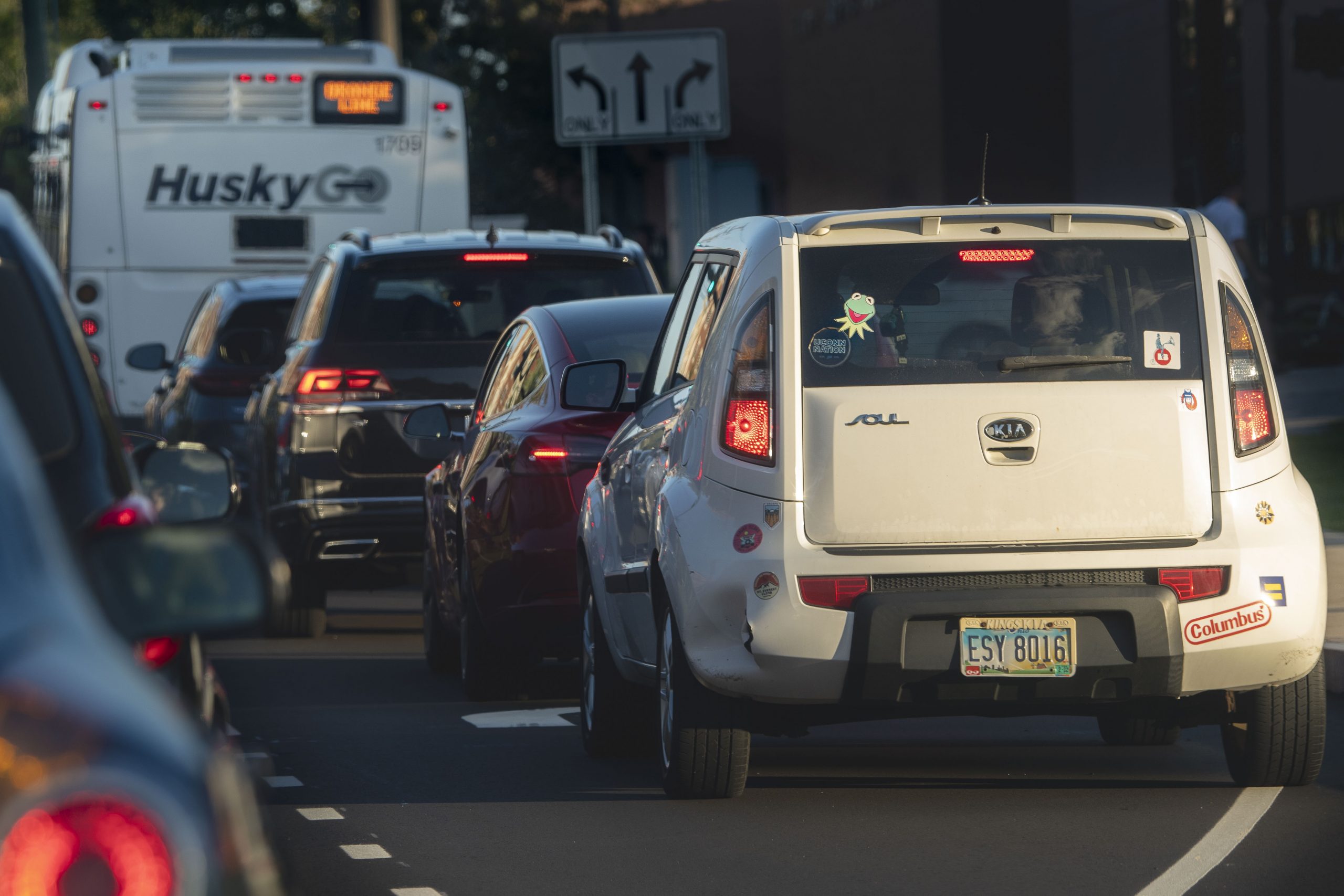For many people, crucial turning points define, or perhaps reroute, their life trajectories.
 Joseph Zinski (’10), an undergraduate student pursuing his B.S. in Chemical Engineering with a minor in Molecular and Cell Biology, aspires to a research career perhaps involving stem cell science. This ambitious aim emerges not only from his keen intellect, dedication and promise, but also a life-altering accident.
Joseph Zinski (’10), an undergraduate student pursuing his B.S. in Chemical Engineering with a minor in Molecular and Cell Biology, aspires to a research career perhaps involving stem cell science. This ambitious aim emerges not only from his keen intellect, dedication and promise, but also a life-altering accident.
One of nearly 700 students in his senior class, Joe graduated from Eastern High School in Voorhees, NJ. He credits two influential individuals with his decision to pursue a career in engineering: his structural engineer father and a much-admired high school teacher, AP Chemistry teacher William Crozier.
When it came time to decide upon a college, Joe — a top student and outstanding swimmer — had many options, including Ivy League colleges, which, he said, “Seem to promote a cut-throat, highly competitive atmosphere among their undergraduates that I found unattractive.” During the summer sandwiched between his junior and senior high school years, he became acquainted with UConn through the Mentor Connection program, which allowed him to research organohydrogels in the laboratory of chemistry professor Challa Kumar. The experience was formative, so while many of his friends left for the University of Maryland, Joe decided upon UConn. “I liked the UConn engineering culture, which promotes a more cooperative learning environment and works to retain students. I also found the Storrs campus beautiful, with the mix of historic and state-of-the-art new buildings.”
Shortly after finishing his freshman year in 2005, Joe suffered a catastrophic diving accident in which he broke his neck, rendering him a quadriplegic. He underwent surgeries and countless hours of intensive physical therapy in his bid to reclaim not only mobility in his arms but also his educational dreams. The same qualities that made him a champion swimmer are helping Joe rebuild his educational, personal and career goals. With unflagging determination, grit and humor — and aided financially by a generous merit-based Northeast Utilities Engineering Scholarship — he returned to UConn to continue his education.
Despite the challenges of his reduced mobility, including the hurdles of maneuvering campus in a wheelchair and continuing to maintain a rigorous schedule of physical therapy, Joe has remained a serious scholar, a member of the University’s Honors Program, a New England Scholar and a regular on the Deans List. He has also engaged in laboratory research over the last two years — in the area of his former nemesis, biology — and he was recently awarded a Summer Undergraduate Research Fund (SURF) grant to continue his research on campus this summer. In addition, Joe just received word of his acceptance into a summer internship at the Harvard Stem Cell Institute. The coveted internship is awarded to just a handful of non-Harvard students each year, and Joe is ecstatic. He plans to choreograph his summer schedule to accommodate both the Harvard Stem Cell and UConn SURF research projects.
In the Lab: Modeling a Bacterium
The Harvard internship is the first step toward one of Joe’s aims: to become involved in stem cell research, which holds promise of helping individuals afflicted with severe spinal injuries. A different type of research opportunity presented itself during the 2007-08 school year, when he began work in the laboratory of Pathobiology professor Dr. Steven Geary. There, he assisted doctoral candidate Steve Szczepanek in work involving the genomic sequencing of the bacterial pathogen Mycoplasma gallisepticum (MG), which causes respiratory and reproductive diseases in poultry. A serious affliction that is easily transmitted within the cramped conditions of most commercial poultry operations, the presence of M. gallisepticum often causes commercial poultry farmers to destroy entire flocks to eliminate the disease, resulting in an estimated $500 millions annually in the U.S. alone. Joe said M. gallisepticum lacks a cell wall, which makes treatment difficult because antibiotics that inhibit cell wall formation cannot be used.
The aim of Dr. Geary’s research program on M. gallisepticum, funded by NSF and USDA, is to contribute toward the development of effective avian vaccines and treatments.
Calling it a “small genomic bacterium, with just under 1 million base pairs, and the first I’ve gotten to know intimately,” Joe pointed out that M. gallisepticum also causes conjunctivitis in songbirds and displays degenerative evolution: over time, unused genes simply disappear from the genome. He said that although MG has been sequenced, only a portion of the bacterium’s proteins, which are responsible for the bacterium’s virulence, have been identified.

The research interested him, so when it came time to choose a project for his senior Honors thesis, he worked out an arrangement with Dr. Geary and Dr. Ranjan Srivastava, an associate professor of Chemical, Materials & Biomolecular Engineering, to co-advise his continued research on M. gallisepticum over the summer and through next year.
The long-term project involves both “wet lab” and intensive computing. Under Dr. Srivastava’s guidance, Joe said, “I will study the metabolism of various cell types by using metabolic models and mass balances to create working digital models of the living cell. These models can be used to predict the use and production of metabolites [such as oxygen, glucose, CO2 and certain amino acids] as well as the growth rate of the cells. The model can then be easily modified to predict the metabolic response of deleting certain reactions or pathways. I’m building a metabolic model of M. gallisepticum with the aim of using it to predict which genes could be eliminated to create vaccines.”
Joe’s development of a metabolic model will involve the use of complex software tools, including Pathway Tools, a bioinformatics software system that allows researchers to predict metabolic pathways based on an organism’s genome, along with a probability-based Bayesian classifier. For the M. gallisepticum portion, he will rely on genomic sequencing and annotations developed in Dr. Geary’s lab, largely by Research Associate and microbiologist Edan Tulman.
After developing a computer model, in the Pathobiology wet lab, Joe will focus primarily on studying virulence factors in M. gallisepticum. “I’ll perform assays to monitor the uptake and discharge of certain metabolites. I’ll also measure cell growth. Then I’ll compare my experimental data against the model and modify the model as needed to ensure it accurately predicts the real performance of the bacterium.”
In the final phase, working with other researchers in Dr. Geary’s lab, Joe plans to compare two similar strains of the bacterium, a wild strain and a clone that has been “evolved” such that it is non-virulent. This analysis will allow him to create a more accurate metabolic model for the evolved, non-virulent strain of M. gallisepticum and to compare the virulent and non-virulent models to identify differences. The modeling results may then provide a basis for development of new drugs to treat the virulent strain.
Joe will graduate with his B.S. degree in May ’10, but he plans to continue his education by pursuing a doctorate in either metabolic engineering or stem cell research, with the goal of becoming an academic researcher.
Fundraising for Disabled Athletes
Joe’s commitment to improving the lives of individuals with spinal cord injuries extends beyond the research lab. Last year, he organized a fundraiser for the Swim With Mike Foundation (SWM), a University of Southern California-based organization that provides scholarships for former athletes who experienced a disabling injury or condition. Joe was awarded this merit-based scholarship in 2006 and it — in combination with the Northeast Utilities Engineering Scholarship — provided the financial support he needed to continue his education following his injury. SWM sponsors annual swim-a-thons at USC and the University of Hawaii to raise funds in support of these critical scholarships. Last year, Joe coordinated with the Honors Council and Student Athlete Advisory Council (SAAC) to host a very successful swim-a-thon/water volleyball tournament fundraiser at UConn. Thesecond annual SWM tournament will take place on Sunday, April 19, 2009 (pleaseclick here for details). It is Joe’s hope that UConn will commit to this fundraiser as an annual event even after he graduates.


